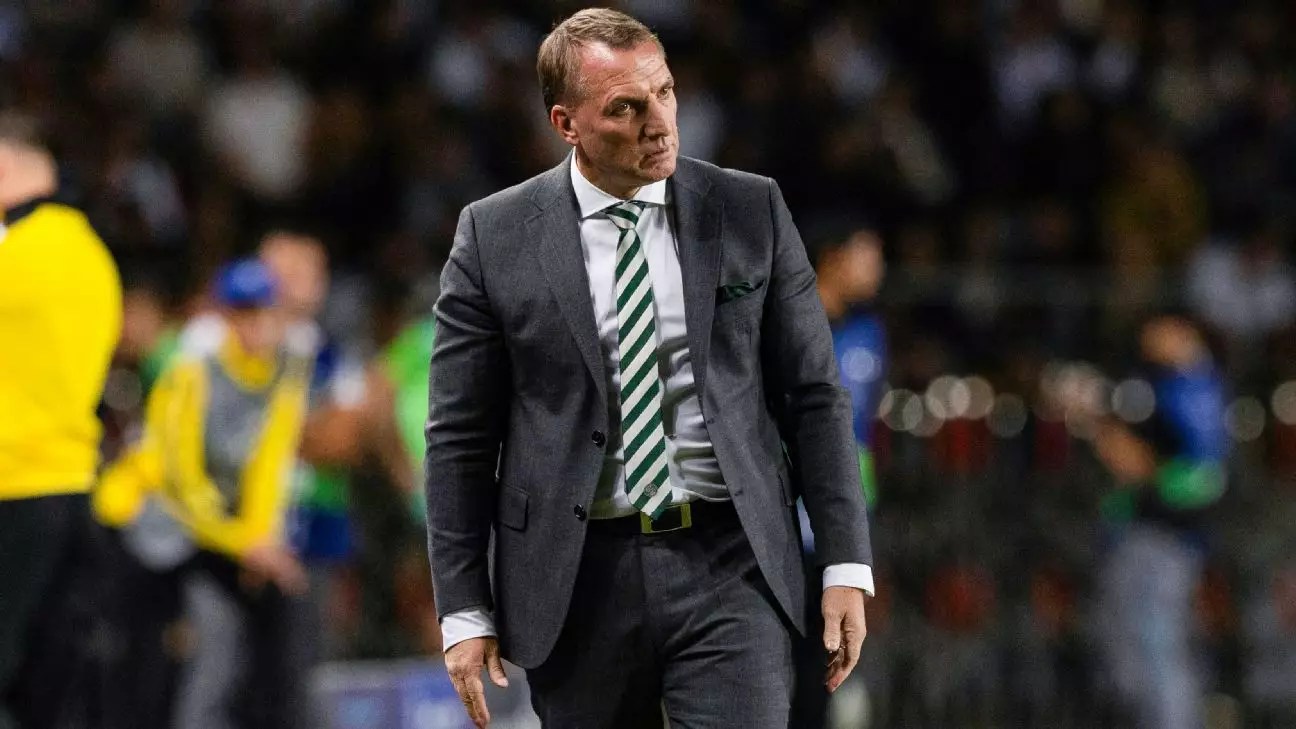Celtic’s recent failure to advance in the Champions League playoffs exposes a deeper issue that transcends mere tactical miscues. The club’s inability to reinforce its squad with the necessary attacking firepower has proven to be a critical shortfall. The decision to allocate only a modest transfer budget—approximately £3 million—while aiming for a deep European run appears shortsighted in a landscape where incremental investments can yield significant competitive advantages. This approach not only hampers the team’s immediate prospects but also undermines the club’s long-term ambitions. With no effective addition of wingers following Jota’s injury and the departure of Nicolas Kühn, Celtic’s attacking options remain static and predictable, giving opponents an easier time to neutralize their offensive threats.
Rodgers’ Frustration: Masked Disappointment
Brendan Rodgers’ candid remarks post-match reveal a manager acutely aware of the club’s strategic missteps. His comments about investment needing to be timely and well-considered underscore the importance of planning and resource allocation—elements that Celtic appear to have overlooked. Rodgers’ diplomatic tone may hide his frustration, but the underlying tone suggests a sense of disappointment with the club’s inability or unwillingness to act decisively. This missed opportunity to bolster the squad before a pivotal clash has, in essence, thrown the team into a state of chaos, forcing them to navigate a grueling 210 minutes without the offensive firepower necessary to unlock tight defenses.
The Consequences of Defensive Shortsightedness
The absence of fresh attacking options has culminated in a sterile, uninspired offensive display against Kairat Almaty. Despite a late push dominated by Celtic, the team failed to convert opportunities, notably Daizen Maeda’s crucial miss in the 86th minute. Extra time offered little relief, as Celtic struggled to find the innovation required to gain the upper hand. This stagnant attack, coupled with the inability to capitalize on chances, reveals a broader failure in squad management. The decision not to bring experienced players like Shin Yamada off the bench further exemplifies Rodgers’ cautious approach, but it also highlights a lack of confidence—both from the manager and the club—regarding the available depth and quality.
Financial Constraints and Their Cascading Effects
Financial prudence, while often a virtue, may have become a hindrance in Celtic’s case. The club’s modest transfer expenditure starkly contrasts with the ambitions of competing in Europe’s elite competitions. Losing out on Champions League qualification could mean losing valuable revenue streams—upward of £20 million—thus creating a vicious cycle where financial restrictions are justified as a means of austerity but ultimately hinder progress on the pitch. The club’s window additions, namely Kieran Tierney and Benjamin Nygren, failed to replace key personnel adequately, leaving the squad fragmented and vulnerable. Fan discontent grows louder as speculations intensify about whether the club’s management values sustainable growth over immediate glory.
The Future Path: Strategic Clarity Needed
Rodgers’ comments about the importance of “timely investment” serve as a warning rather than reassurance. Their lack of clarity on the impact of missed European revenue signifies underlying strategic ambiguity. If Celtic intends to thrive, it must shift from reactive short-term planning to a proactive, well-structured recruitment strategy that aligns with competitive demands. The upcoming transfer window and the fixture against Rangers loom large, demanding both tactical acumen and financial agility. Unless the club embraces a more aggressive, goal-oriented approach to rebuilding the squad, it risks falling further behind its rivals and eroding the progress made last season.
This episode must serve as a stark reminder: ambition alone is insufficient without the corresponding tactical and financial backing. Without a clear resolution to their recruitment issues, Celtic’s future in Europe—and the broader challenge of maintaining domestic dominance—remains uncertain. The club’s leadership must confront their strategic deficiencies head-on or accept the consequences of sustained stagnation.


Leave a Reply